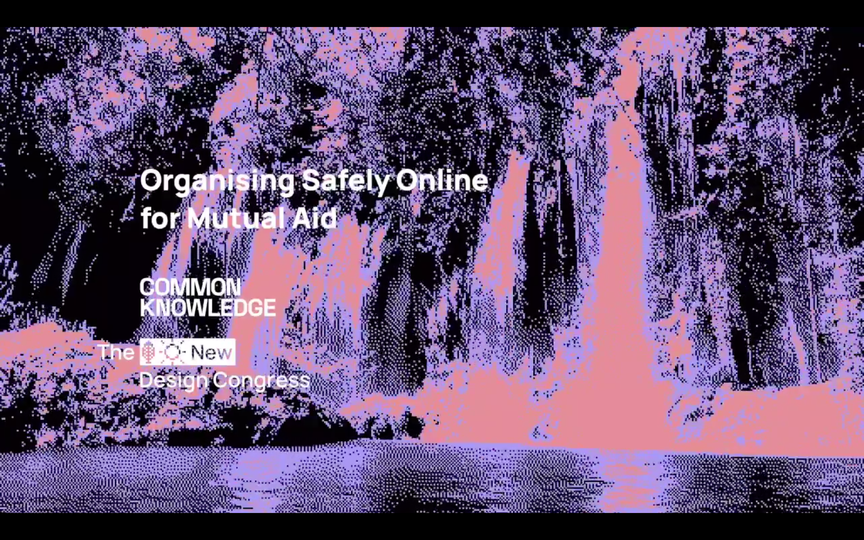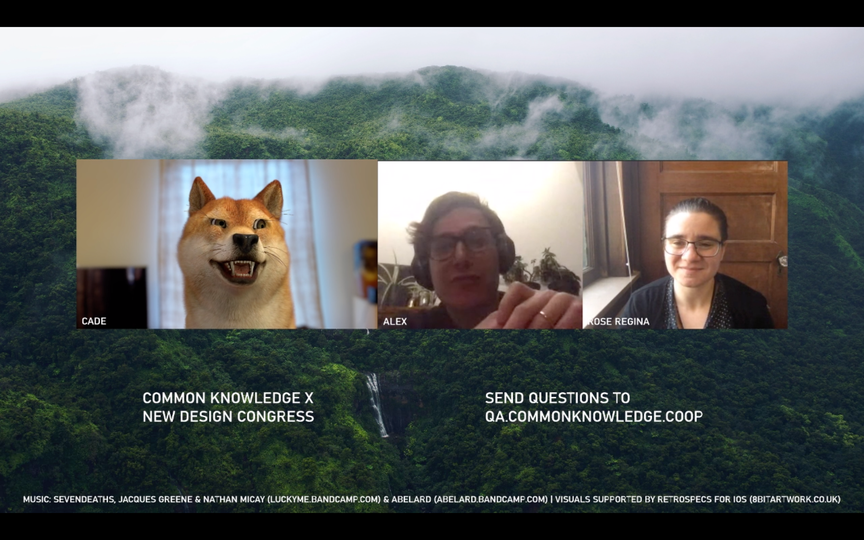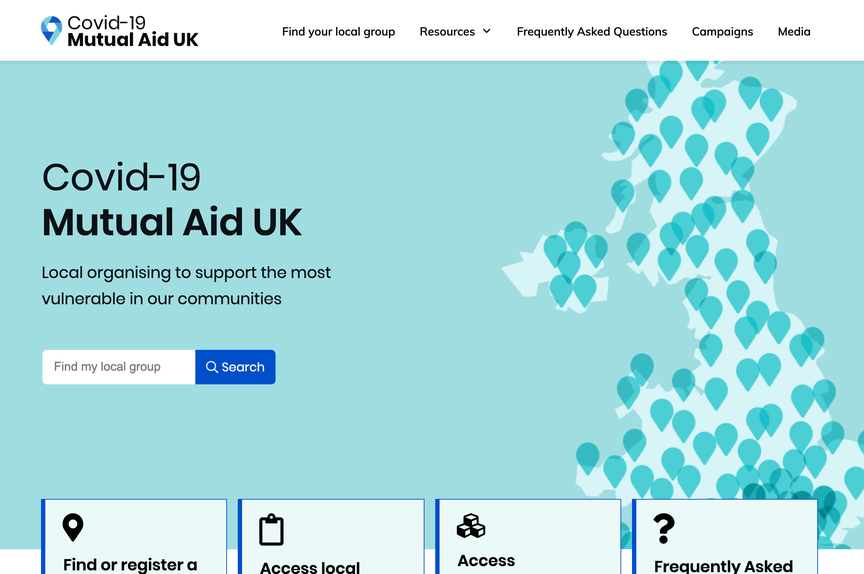Weeknotes 13
We've missed the last few editions of weeknotes, as we've all been adjusting to the new normal. Our last weeknotes , published in mid-March, now feel like they've been written in another era.
We're trying to make sure within the co-op that we aren't too hard on ourselves in these uncertain times, recognising the monumental shift that everyone, across the world, has been forced to make practically overnight.
What we got up to
Organising Safely Online for Mutual Aid
In collaboration with The New Design Congress , we livestreamed a Q&A session for anyone worrying about this sudden mandatory online life and its implications for personal and community safety.
Cade and Rose Regina discussed risk management, privacy and community moderation. They talked through how to play "anxiety games" to help you confront digital risk and react to real world outcomes ahead of time.
We also answered a range of questions about tools and platforms, best practices and so on.
You can watch the conversation in full over on Twitch or above. We're also going to be summarising the discussion in a blog post.


We wrote a very quick form for people to submit questions with some level of anonymity. The Netlify built-in form handling is really impressive, as is so much of their architecture.
How tech can support mutual aid
A few weeks ago – that's a few years in 2020 terms – we built a tool to sync the different lists of UK-based Mutual Aid groups, including Freedom Press and Covid-19 Mutual Aid.
The tool is coded in plain Javascript and requires Node.js. This was done to hopefully enable use on client web apps as well as servers, as opposed to the more common data language of Python.
We deprecated our Airtable database in favour of the Covid-19 Mutual Aid UK spreadsheet.
Not long after this, the Covid-19 Mutual Aid UK group reached out to us and a few others for assistance with their digital organising.
How we approached this
We knew of another couple of initiatives within the digital space, including the Coronavirus Tech Handbook and COVID19 UK Tech Response / Code4Covid Slack group . We contacted organisers from both groups to work out what was needed and how best to coordinate our efforts.
We then did a call out for digital volunteers using an Airtable form. Using MailChimp, we set up a newsletter list and a few different communication channels, including a GitHub group and Trello board for project management.
The Saturday before last, we sent an onboarding email, asking volunteers to start by joining their local mutual aid group and offering their digital skills, so they can learn what is needed across the UK mutual aid network.
In this email we invited these volunteers onto the existing Code4Covid Slack, asking them to feed back the user needs they were learning about through their involvement with different groups.
We also identified a few urgent projects, including making the Covid-19 UK Mutual Aid website more accessible – a particular concern for the Covid-19 UK Mutual Aid organisers – and user-friendly. We wanted to get people to be able to find the information as easily as possible, thus lessening the burden on the Covid-19 UK Mutual Aid organisers to answer basic questions (e.g. "which group should I join?") through email and Facebook message.
We used our Airtable volunteer list to assemble a team based on their skillset and availability, gave them some context and put them in a Slack channel together.
The team worked together to design and build a new version of the identity and website, co-ordinating with the team working on the map, in just eight days.
We're so impressed and happy with their hard work. This is what mutual aid and self-organisation looks like!

Cooperation Town
We've also been helping our friends at Cooperation Town in their efforts to distribute over 800 meals to vulnerable people in Camden, Islington and Haringey.
From their Facebook page:
We sourced, stored, packed and delivered nutritious food to where it was most needed, we collaborated with disability, homelessness and refugees support organisations, we had a whole online distribution system built for us (for free!) by comrades overnight and we had an incredible crew of Mutual Aiders who delivered food around on foot, by bike and by car. We devised an entire operation built on trust, not transaction.
We did all this with no support from the council or the government, without asking for permission or depending on any centrally authorised system. We proved that, when the state fails us, we will organise ourselves and our communities, collectivise resources and take direct action to care for each other.
We intend to do this every week.
Other projects
We built a new CMS for The World Transformed using Wagtail and Gatsby. We really loved using Wagtail and feel it is a CMS we may use frequently in future.
We held a kick-off workshop with United Voices of the World . We're going to be working with them to improve their digital systems for dealing with membership and casework.
We got started on a new project for Nurses United UK , a new organisation for nurses by nurses campaigning for the future of the profession and the NHS. We're so excited to work on this, especially at this time.
Digital tools
We started using Float for project management, a tool recommended to us by Outlandish . We love it! (We acknowledge that Alex has been trying to get us to this for six months.) It helps us get a better overview of the co-op's capacity and all the projects we have on the boil, as Notion doesn't provide this type of view.
We also tried a few collaborative brainstorming tools and settled on Miro . Although we really miss working together in physical space, there are certain advantages to using a digital tool for this, including being able to sort stickies into a grid and export the board at the end.
After a week or so of trialling all sorts of different video chat software , we settled on Wire for our internal video calls.
Of all the tools we tried, Discord was our favourite in terms of user experience and functionality. However, it is not end-to-end encrypted, which is why we ended up choosing Wire.
We also found that it was confusing to have too many text communication channels, given that we are already using Signal for our day-to-day chat.
We have an interesting organisational quirk at Common Knowledge in that we've deliberately never used real time chat to organise ourselves, preferring long form communication on Notion and video calls. Our Signal channel deletes all message after 12 hours and we try not to let it go much above day to day banter or "have you got the keys"-level coordination.
In general, we've taken some advice from Basecamp on this :
What we’ve learned is that group chat used sparingly in a few very specific situations makes a lot of sense. What makes a lot less sense is chat as the primary, default method of communication inside an organization. A slice, yes. The whole pie, no. All sorts of eventual bad happens when a company begins thinking one-line-at-a-time most of the time.
We’ve also seen strong evidence that the method and manner in which you choose to communicate has a major influence on how people feel at work. Frazzled, exhausted, and anxious? Or calm, cool, and collected? These aren’t just states of mind, they are conditions caused by the kinds of tools we use, and the kinds of behaviors those tools encourage.
We think that more often than not group chat makes people "frazzled, exhausted, and anxious".
Wire sadly only offers video chat for up to four people. This is fine for a four person co-op like us, but unfortunately means that it isn't a viable Zoom replacement (yet).
It's frustrating to us that there isn't a good, end-to-end encrypted, open source alternative for video chat, given the privacy concerns with Zoom. We're concerned about the amount of activist groups that are now using Zoom for all of their organising now.
Jitsi is good, but we've had a number of connectivity issues with it and you still need to trust those hosting the server and the Jitsi Videobridge , as it is not truly end to end encrypted . As someone pointed out to us, when Google throw all their resources at Google Hangouts, also control the underlying browser and it is still not as good as Zoom, you have to wonder if anyone can make the underlying technology - WebRTC - work without a native application.
Quarterly planning day
This week we also held our quarterly planning day, where we did a retrospective of the last quarter, scored and assessed our Objectives and Key Results, did a strategic analysis of the new quarter and then drafted new Objectives and Key Results.
It was amusing (in a tragic sort of way) to look back at our last workshop notes from January, when we thought the post-General Election defeat was the low point of the year.
We all find these planning days incredibly useful and clarifying. We're going to write up our full process in another post, including reflections on how to run these workshops digitally.
Talks and meetups
We gave a talk at the Philosophy and Ethics in Digital Tech Society at Second Home. The topic was Radically different: How can we create digitally driven organisations from the ground up using philosophy and ethics . We talked about how we have hard-coded the ethical and philosophical vision of our cooperative into its organisational structure, processes and even legal DNA.
We also hosted the second session of the London Notion meetup. It was nice to be able to talk about something that wasn't coronavirus. Thanks to Notion for lending us their Crowdcast account to bring this online and for Yau for helping put it all together.
What we're thinking about
Our planning day has us looking to the future, thinking about how we might help facilitate the movement's transition to digital-first activism. As political organising shifts online, we want to train people in digital organising, keep facilitating technical activists to support grassroots organisations and build and maintain digital infrastructure that the left owns and controls themselves.
If this sounds interesting to you, if you're looking for help with your digital organising, if you have a project in mind or if you just want to chat with us, send us an email: hello@commonknowledge.coop